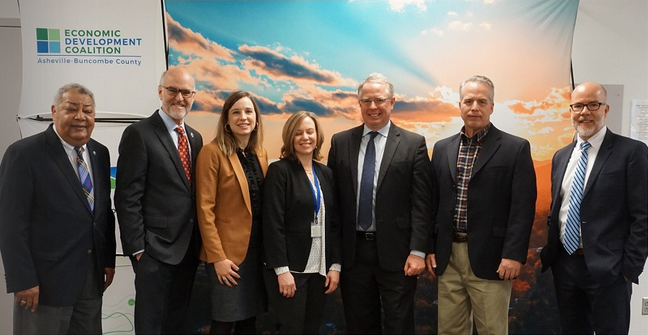As Buncombe County’s unemployment reaches record levels — at 17.5% in May, the latest month for which data is available, the rate is more than quintuple that in May 2019 — efforts to recruit employers have also hit hard times. The Economic Development Coalition for Asheville-Buncombe County recently reported its worst results in four years.
According to the EDC’s most recent annual report, the coalition attracted just $20 million in capital investment to Buncombe County in fiscal year 2019-20. That figure is down nearly 40% compared to the $33 million invested in fiscal 2018-19. Job creation also saw a sharp decline, down by about half year-over-year.
Clark Duncan, the EDC’s executive director, places blame for the slowdown squarely on the COVID-19 pandemic. Uncertainty about when and how the global economy will recover, he says, has curbed the enthusiasm of businesses to come to Buncombe.
“Economic development announcements are typically leading indicators of economic expansion and job growth,” Duncan explains. “As you might expect, the public health crisis that consumed the last four months of the fiscal year has significantly slowed corporate decision-making and dampened the kind of economic confidence required for large new job or investment commitments.”
Duncan notes that last fiscal year’s picture wasn’t completely dark, with medical plastics manufacturer Jabil Healthcare and electronics maker Charles Edward Industries announcing substantial investments during the last several months. He says life sciences and technology are both industries with “tremendous” potential for the region.
And Duncan strikes an upbeat note about the future. “I’m optimistic that many of those plans will spring back to life in the next six to 12 months,” he says. “The fundamentals of skilled workforce, community growth and quality of life will continue to attract the kind of economic growth we need in Western North Carolina.”
But information presented last November during the EDC’s own Metro Economy Outlook suggests that Buncombe County may be battling strong national headwinds for the foreseeable future. At that event, Bernard Baumohl, recognized by The Wall Street Journal as the most accurate economic forecaster of 2018, said the next recession would likely be driven by a downturn in consumer spending and “acts of human folly.”
Regarding Baumohl’s first point, the U.S. Bureau of Economic Analysis reports that month-over-month spending by American consumers plummeted by 12.6% in April after falling 6.6% in March. Although spending recovered by 8.2% in May, that increase makes up less than half of losses since the start of the pandemic.
Regarding the second point, as reported by NPR, the head of the World Health Organization said on June 29 that a disjointed global response had failed to contain the coronavirus. “The lack of national unity and lack of global solidarity and the divided world … is actually helping the virus to spread,” noted Tedros Adhanom Ghebreyesus. “The worst is yet to come.”




America had a highly fragile economy well before COVID 19. The virus may be the last straw that will put us in a protracted depression.